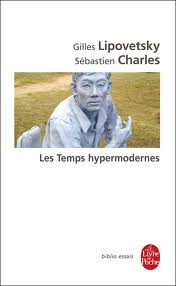Lipovetsky, Les Temps hypermodernes
Our primary text
Our text is Gilles Lipovetsky’s Les Temps hypermodernes, which we shall be reading in the accessible livre de poche edition, which looks like this. This book is a useful introduction to Lipovetsky’s work, given that it is written as a series of conversations with Sébastien Charles. It is reasonably short, so you are expected to familiarize yourself with all of it.
Our author
Lipovetsky (1944- ) is a French sociologist and philosopher who is based in Grenoble. He has had a significant influence on our current interpretations of modernity. From the 1980s on, beginning with the publication of a book called L'ère du vide : Essais sur l'individualisme contemporain, he has examined the nature of mass consumerism, industrial production, and what he identifies as a ‘hypermodernity’. He thus explores many of the detailed ways in which Western democratic society sustains an individualist philosophy of existence, for example via fashion, or sexual ethics.
Key concept
Lipovetsky's key concept of hypermodernity above all brings out some of the complexities and paradoxes that he observes at work in our contemporary social set-up, in which individualist models can actually retain and even encourage social identifications or the willing promotion or adoption of supposedly ‘traditional’ sets of values. We shall also see that by ‘hypermodernity’, Lipovetsky means something different from the notion of postmodernity that other thinkers have put forward. His term is in fact designed to challenge a number of simplifying presentations of history, ranging from chronological development through to the antagonistic interpretations of political ideologies. Some of these issues, for example, will be introduced in relation to the theories and standing of Michel Foucault, whose work you have already looked at. Lipovetsky will take up a different stance to Foucault, when it comes to seeing how and where power is exercised over contemporary individuals and their choices. In this way, we can also draw out how ‘theory’ or theoretical writing can function as an interrogation of interpretations as much as of the complexities and details of reality.
Key issues
Some of the issues that we shall be looking at include:
-
Lipovetsky’s understanding of a shift from a ‘post’ modernity to a ‘hyper’ era
-
Lipovetsky’s criticism of both an ‘apocalyptic’ and an ‘apologetic’ view of modernity
-
The relationship between greater autonomy and greater dependency in societies that are not being overtly directed by authority
-
Our changing conceptions of time, memory, pleasure, identity, spirituality
-
The relationships between political, social, and personal forms of communication
-
Lipovetsky’s views about sexual difference, boredom, reading, philosophy ...
Recommended further reading
Primary reading
Lipovetsky, Gilles, L'ère du vide : Essais sur l'individualisme contemporain (Paris: Gallimard, 1983).
Lipovetsky, Gilles, Le bonheur paradoxal. Essai sur la société d'hyperconsommation (Paris: Gallimard, 2006).
Secondary reading
Charles, Sebastien, For a Humanism Amid Hypermodernity
External links
Gilles Lipovetsky and Hervé Juvin discuss the 'Occident mondialisé'
Recent interview with Lipovetsky
Gilles Lipovetsky - Entreprise et société : comment (re)construire la relation ?






